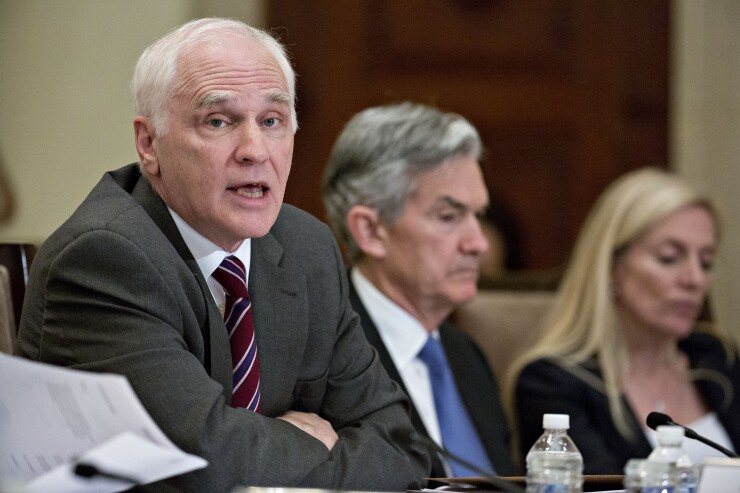Receiving Wide Coverage ...
Farewell: Banks are unlikely to be throwing a lavish farewell party for Daniel Tarullo, the Federal Reserve's "de facto head of bank regulation" and, in the words of the Wall Street Journal, the "
Tarullo's resignation, which opens a third vacancy on the Fed's seven-seat board, "is another step forward for the Trump administration's plan to ease rules for Wall Street," the Journal added, "It will also give the new administration a chance to quickly influence U.S. monetary policy."

Indeed, bank stocks jumped after Tarullo's resignation was announced. "The reaction inside banks was more muted, but likely no less gleeful," the Journal's Heard on the Street column noted. "For the past eight years,
Tarullo himself had some positive words about Trump's plans to roll back financial regulation. In an interview with the FT, discussing Trump's plans for overhauling Dodd-Frank, he said: "Those seven principles seem to me a
Point man: Gary Cohn, President Trump's director of the National Economic Council, "has emerged as the most powerful economic policy maker in its early days," the Journal reports, and "is rapidly assembling a growing portfolio that could solidify his influence in the administration for the long term. The White House has designated Mr. Cohn to play a central role on taxes, infrastructure, financial regulation and replacing the Affordable Care Act."
One person who's not a member of the Gary Cohn fan club is Alan S. Blinder, a former Fed vice chairman and now an economics professor at Princeton. In an op-ed piece in the Journal, Blinder writes that "President Trump seems to be looking for
Democrats in the U.S. Senate aren't crazy about Cohn, either. Senators Elizabeth Warren of Massachusetts and Tammy Baldwin of Wisconsin wrote a letter to Cohn's former boss at Goldman, chairman and CEO Lloyd Blankfein, asking for "a full recounting of interactions between the pair" since Cohn left the firm to join the Trump administration, the Financial Times reports. "We are concerned that Mr Cohn ... will be unable to develop economic policies that will help middle-class families, and will instead
Wall Street Journal
Hackers target more banks: A growing number of recent cyberattacks on financial institutions, including those in the U.S., may be the work of North Korean hackers who were behind the 2014 attack on Sony, according to some researchers. "It is unclear to the researchers exactly how many banks were compromised or whether any suffered financial losses," the Journal reports, but the evidence suggests "that the group is
Dear Abby: The Moneybeat column recounts some of the "good, great, and not-so-good" calls made over the past 30 years by
Financial Times
Bargaining chip: The FT editorializes that the Volcker Rule is "a
New York Times
The ups of down:
Quotable ...
"When you're dealing with the economy, which is my realm, you have to be pragmatic. You have to be realistic to what's going on in the world and you have to be





